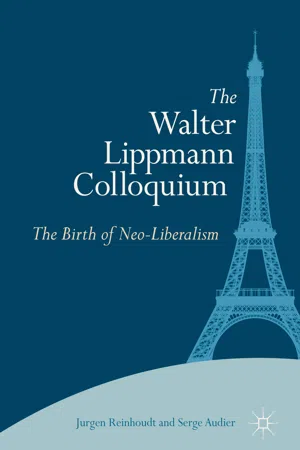Although the term “neo-liberalism” has been frequently used in recent decades, much analytical ambiguity continues to surround it.1 The 1938 Walter Lippmann Colloquium, the theoretical birthplace of neo-liberalism, has been the subject of recent interest.2 Even as scholars readily acknowledge the Colloquium’s importance, relatively little has been written about this crucial primary source, particularly in English-language scholarship.3 The French liberal economist François Bilger, in his analysis of German ordo-liberalism published in 1964, refers to the Lippmann Colloquium and its importance, but without elaborating the point.4 More recently, the English historian of the Thatcher revolution , Richard Cockett, refers quickly, in passing, to the Lippmann Colloquium as well.5 Max Hartwell , a liberal historian of capitalism and member of the Mont Pèlerin Society on whose work Cockett draws—despite markedly different political convictions—refers to the Lippmann Colloquium as well, but briefly also: he focuses on the history of the Mont Pèlerin Society after World War II.6 In their analysis of European liberal ideas, Vivien Schmidt and Mark Thatcher (2013, 7–9) also mention the Lippmann Colloquium, but briefly. The importance of the Walter Lippmann Colloquium has therefore been known for some time, albeit in a somewhat confidential manner. Nevertheless, none of these authors—of different intellectual perspectives—provide a full description or analysis of the Colloquium, as though its meaning was clear, and as though the Colloquium ought to be considered merely a step—a fateful step to some, a beneficial one to others—without particular specificity leading to the Mont Pèlerin Society and the triumph of “neo-liberalism” in the late 1970s and 1980s.
Discovering an Essential Document in the History of “Neo-Liberalism”
Even the concept of “neo-liberalism” is far from being clear, however, as the analysis of the Lippmann Colloquium demonstrates. In fact, the term “neo-liberalism” has a complex history. In the 1930s through the 1950s, French economists Alain Barrère and Gaëtan Pirou —two important figures in French economic thought who were openly distant from classical liberalism—among others, distinguished “neo-liberalism” from nineteenth-century “laissez-faire ” liberalism in their histories of economic thought.7 The well-known German political scientist Carl Friedrich used the term “neo-liberalism” to refer to Germany’s ordo-liberal theorists.8 , 9 In the 1970s, the term “neo-liberalism” was occasionally used, for instance by the French “new economists” who popularized the ideas of Friedrich von Hayek and Milton Friedman ,10 and, in their wake, by Michel Foucault in his lectures on the birth of the biopolitics,11 as well as, still around the same time, by a leader of the left wing of the French Socialist Party.12 From the 1970s on, the rational-choice models developed by Gary Becker13 and the Public Choice school theory developed by Gordon Tullock and James Buchanan have sometimes been conflated with “neo-liberalism”. In Latin America, after the coup d’état in Chile and the work of the “Chicago boys”,14 use of the term “neo-liberalism” spread, although not immediately.
It was in the 1980s, and even more so in the 1990s that the term “neo-liberalism” increased sharply in usage. The elections of Ronald Reagan and Margaret Thatcher and the implementation of their economic programs, focused on deregulation, tax cuts and (particularly in Thatcher’s case) the privatization of State-owned enterprises, led the term “neo-liberalism” to ultimately be closely identified with their policy programs.15 In the 1990s, in the context of increasing world trade and the “Washington consensus” in vogue at institutions such as the International Monetary Fund (IMF) and the World Bank, the term “neo-liberalism” became even more widely used, almost always in a critical manner.16 When the term “neo-liberalism” began to spread in the 1980s and 1990s, the early history of the movement—its complexities and nuances—would be largely forgotten, also by the promoters of so-called neo-liberal policies themselves, who generally did not claim this term.
“Neo-liberalism” remained an oft-used term in the early twenty-first century. In 2005, the geographer and critical Marxist thinker David Harvey argued “there has everywhere been an emphatic turn towards neo-liberalism in political-economic practices and thinking since the 1970s”.17 In 2010, Manfred Steger and Ravi K. Roy argued neo-liberalism was “a rather broad and general concept referring to an economic model or ‘paradigm’ that rose to prominence in the 1980s”.18 In recent years the term “neo-liberalism” has more and more often been used in a critical vein.19 In the wake of the 2007 financial crisis “neo-liberalism” as a set of ideas has received renewed attention, again much of it critical.20 Often, neo-liberalism has been conceived of as the equivalent of unbridled laissez-faire , linked to the deregulation and liberalization of markets. Other understandings of the term have spread, however. Notably in response to the debates on the distinctiveness of the “neo-liberalism” of European integration since the 1990s—but not exclusively—there has been also a renewed interest in theories of the “strong State”—standing above competing interest groups to guarantee the effective functioning of the market order—in the context of early neo-liberal thought.21 In fact, it is unclear whether “neo-liberalism” refers to the “withdrawal” of the State from the economy or, to the contrary, to the rise of a strong State guaranteeing market-based competition . These ambiguities are all the more reason to return to the roots of “neo-liberalism”.
As a primary source, the 1938 Colloquium remains significant because it marks the formal birthplace of neo-liberalism as an intellectual movement. The Lippmann Colloquium transcript is exceedingly difficult to find and as a result much knowledge of it is secondary.22 Some of the contributions to the Colloquium were not recorded, rendering the primary source incomplete. Similarly, no audiotape that could serve as an independent scribe of the Colloquium is available. There does exist, however, an edi...
